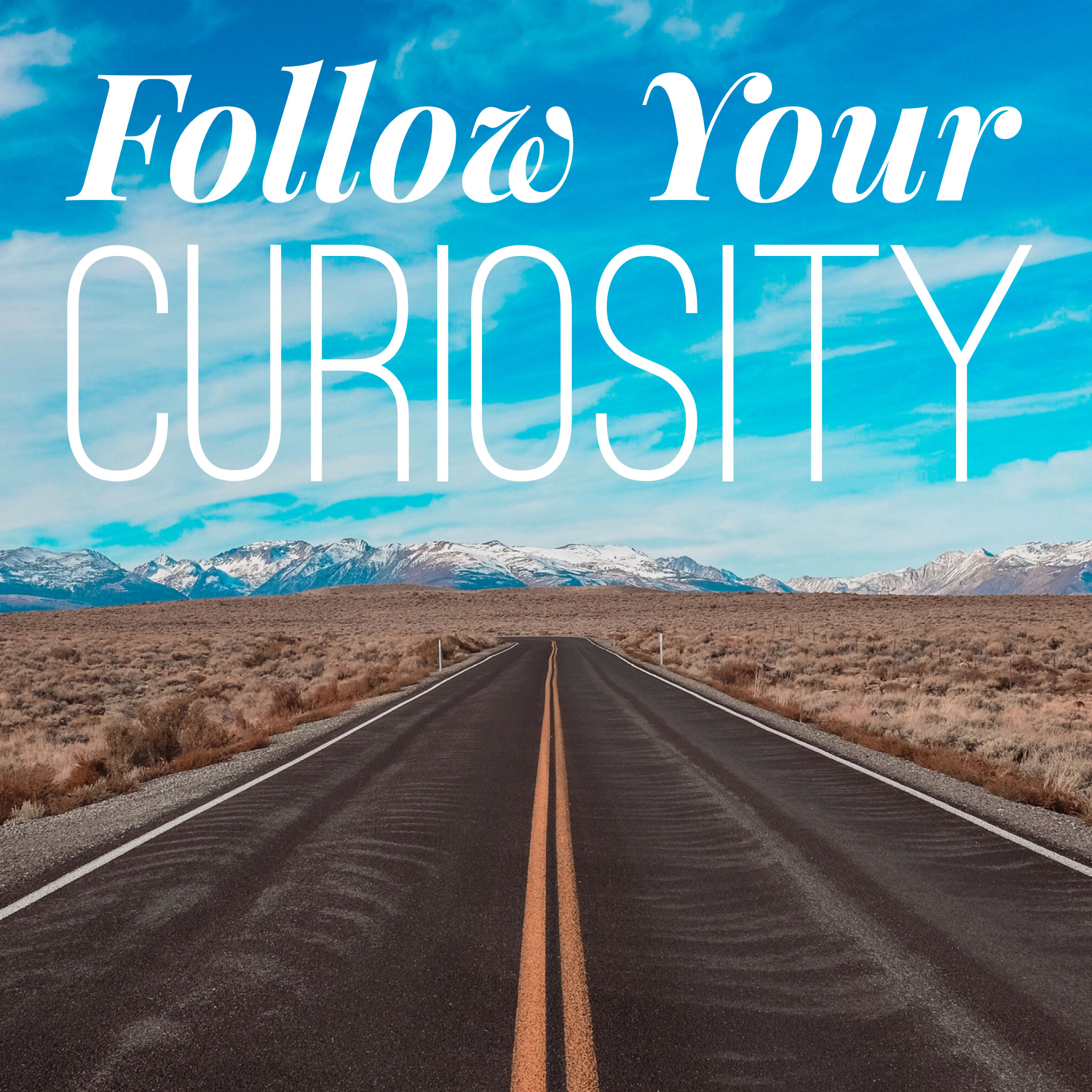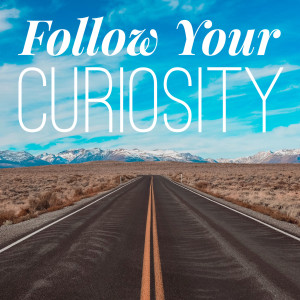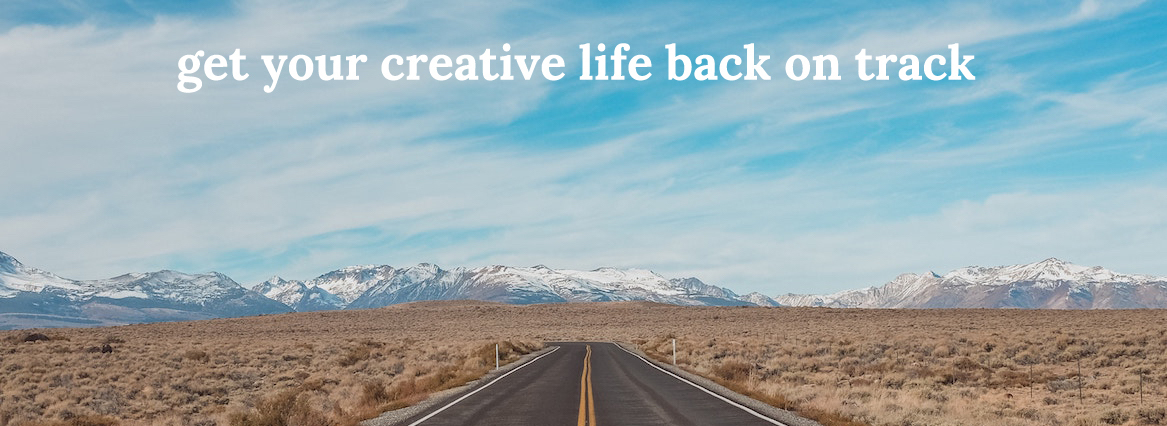
25.5K
Downloads
267
Episodes
Some of the most interesting and inspiring stories I’ve heard are about people’s creative journeys and what they’ve learned along the way. The world needs to hear more of those stories, and now you can hear them on the Follow Your Curiosity podcast. Twice a month, you’ll hear a new interview where we delve into one person’s creative journey. Some of these folks will be better known than others, but they’ll all hold up a mirror to the importance of creative endeavor in every life. In the alternating weeks, you’ll hear short Creative Pep Talk episodes where I feature a creativity tool or tip to help you keep your creative energy flowing. You’ll find something you can use in every episode of Follow Your Curiosity!
Episodes

6 days ago
CPT #107: Rethinking "Hard"
6 days ago
6 days ago
What do you tell yourself when things get hard? Here's a short take on a different perspective to help keep you on track.
I teach women how to reignite their lost creative spark. If you’ve been tearing up when you encounter other people’s art because you’ve lost touch with your own, let's talk.
Want more tips? Check out with all my previous Creative Pep Talks in this playlist!
Could you leave a review? It's really easy, and it helps SO much. Thanks!
If you'd like to stay up to date on things like my courses and also get podcast and event updates, and my latest musings, subscribe to The Spark!

Sunday Jun 15, 2025
How Curiosity Fuels Your Creative Power with Terise Lang
Sunday Jun 15, 2025
Sunday Jun 15, 2025
Terise Lang is a certified life, health, and wellness coach with a lifelong interest in and love of all things creative. She joins me today for a wide-ranging discussion of the power of creativity, including the way she uses creativity in her work, how our creativity is so often socialized out of us in the name of more conformity, our tendency to define creativity too narrowly and then decide that we don’t have it, the hidden creativity in fields like software engineering and cooking, how managers unconsciously limit their staff’s creativity while trying to foster it, the impact of artificial intelligence on our creative lives, and more.
Episode breakdown:
00:00 Introduction
04:21 Creativity gets socialized out, but it's dormant, not gone.
08:16 Everyone's unique perspective shapes creativity, even in simple family plays.
12:31 Start simply; creativity can revive with sketching, coloring, small experiments.
16:57 Software engineers, tech support, and problem-solving require creativity daily.
21:12 Recognize personal talents; downplaying strengths limits growth and joy.
25:24 Curiosity is essential—asking questions and exploring fuels creativity.
30:01 Coaching methods benefit from creativity; adapting routines yields effective results.
34:42 Tapping uses creativity; modifying it improves outcomes for clients.
38:56 Taking breaks, doing creative activities, and doodling refresh the mind.
44:14 Act your age debate; enjoying creativity is ageless and joyful.
48:13 Managers must encourage and credit staff creativity to boost morale.
52:47 Joy and growth flourish when creative self-expression is valued.
55:43 Society elevates machines, but AI can't replace human creativity.
01:00:42 AI uses resources, regurgitates information, can't replicate unique human writing.
If you enjoyed our conversation, I hope you’ll share it with a friend.
Check out the full show notes (now including transcripts!) at fycuriosity.com, and connect with me and fellow creatives on Substack.
Please leave a review for this episode—it’s really easy and will only take a minute, and it really helps me reach new listeners. Thanks!
If you’ve been tearing up when you encounter other people’s art because you’ve lost touch with your own, we should talk.

Wednesday Jun 11, 2025
CPT #106: You Really Do Know
Wednesday Jun 11, 2025
Wednesday Jun 11, 2025
Over the years, I've come to the often frustrating conclusion that we know more than we think we do. I tell you why in this short episode.
I teach women how to reignite their lost creative spark. If you’ve been tearing up when you encounter other people’s art because you’ve lost touch with your own, we should talk.
Want more tips? Check out with all my previous Creative Pep Talks in this playist!
Could you leave a review? It's really easy, and it helps SO much. Thanks!
If you'd like to stay up to date on things like my courses and also get podcast and event updates, and my latest musings, subscribe to The Spark!

Wednesday Jun 04, 2025
Teaching, Empathy, and Living Abroad with Alex Poppe
Wednesday Jun 04, 2025
Wednesday Jun 04, 2025
Writer, teacher, and humanitarian aid worker Alex Poppe joined me last year to talk about her journey from acting to teaching to writing, and how her experiences abroad influenced her journey. She returns to the show today to talk about her new memoir, Breakfast Wine, which chronicles her time teaching in Iraq. We also talk about what we each learned from living abroad at different ages and for different amounts of time, the special magic of teaching teens and young adults, and the way the arts teach us empathy and are a uniquely human way to give life meaning. Alex, who worked for USAID, also gives us a glimpse of the power of humanitarian aid around the world.
Episode breakdown:
00:00 Introduction
04:18 Teaching international students changes perceptions about other cultures.
08:16 Political divisions and cultural nuances within Iraq explained.
12:26 Americans are insulated from ongoing events in Iraq.
16:09 Motivations for living abroad differ by age and situation.
20:47 Financial reasons and curiosity drive educators to work overseas.
24:39 The emotional impact of teaching youth in conflict regions.
28:14 Teachers and students mutually influence each other's lives deeply.
32:34 Adjusting to working with USAID and NGO environments.
36:00 Culture shock of returning to the US after years abroad.
40:26 Living abroad changes your outlook and maturity in many ways.
44:11 Encountering anti-American sentiment versus curiosity abroad.
48:09 The arts foster empathy and human connection in society.
52:28 Creative collaboration and failing exuberantly in brainstorming sessions.
56:01 The writing process of Breakfast Wine was messy and surprising.
01:03:34 Personal journey revealed through the writing process.
If you enjoyed our conversation, I hope you’ll share it with a friend.
Check out the full show notes (now including transcripts!) at fycuriosity.com, and connect with me and fellow creatives on Substack.
Please leave a review for this episode—it’s really easy and will only take a minute, and it really helps me reach new listeners. Thanks!
If you’ve been tearing up when you encounter other people’s art because you’ve lost touch with your own, we should talk.

Wednesday May 28, 2025
CPT #105: 16 and Faking It
Wednesday May 28, 2025
Wednesday May 28, 2025
Here's a super-short story: something a friend said to me once that's stuck with me, and why I think it might help you keep some needed perspective on yourself and your creative efforts.
I teach women how to reignite their lost creative spark. If you’ve been tearing up when you encounter other people’s art because you’ve lost touch with your own, we should talk.
Want more tips? Check out with all my previous Creative Pep Talks in this playist!
Could you leave a review? It's really easy, and it helps SO much. Thanks!
If you'd like to stay up to date on things like my courses and also get podcast and event updates, and my latest musings, subscribe to The Spark!

Wednesday May 21, 2025
Harnessing Nature's Wisdom with Jocelyn Hastie
Wednesday May 21, 2025
Wednesday May 21, 2025
Jocelyn Hastie spent 30 years as an accountant before the combination of a stage 4 cancer diagnosis and a sudden job loss forced a radical turn, leading her to work full-time with horses as a way to foster leadership skills and personal growth. She joins me to talk about why it’s not fair to judge accountancy as boring, how bad management and leadership happens (including her own realization that she was a bad manager), what we lose when we forget the lessons of the natural world and our roots in it, what we can learn from the animals around us—including horses—and more.
Read about a lesson I learned from Jocelyn here.
Episode breakdown:
00:00 Introduction
04:25 Family influence suppressed creativity; art rediscovered after cancer diagnosis.
08:32 Jocelyn reflects on common misconceptions about accounting creativity.
12:39 Accountants add value, not just boring number crunchers.
16:32 Jocelyn’s career choice influenced by her father and education.
20:06 Radical life change after cancer and job loss in 2016.
24:35 Horses revealed Jocelyn's management flaws; learned new leadership styles.
28:09 Importance of authenticity and boundaries, not pleasing everyone.
32:25 Animals and nature as teachers for leadership and mindfulness.
36:05 Jocelyn describes her non-riding retreats and somatic awareness.
40:34 Emphasizes intentional learning versus just-in-case learning.
44:05 Life shifts can come from crisis or noticing “little knocks.”
48:54 Childhood expectations shaped independence; cancer forced acceptance of help.
52:23 Lessons from herd dynamics and horses’ instinct to regain calm.
56:07 Gestalt coaching emphasizes honoring emotions and shaking off fear.
If you’ve been tearing up when you encounter other people’s art because you’ve lost touch with your own, we should talk.
Check out the full show notes (now including transcripts!) at fycuriosity.com, and connect with me and fellow creatives on Substack.
Please leave a review for this episode—it’s really easy and will only take a minute, and it really helps me reach new listeners. Thanks!
If you enjoyed our conversation, I hope you’ll share it with a friend.

Wednesday May 14, 2025
CPT #104: Limitations
Wednesday May 14, 2025
Wednesday May 14, 2025
It's counterintuitive, but sometimes limitations are your best friend, especially when you're doing something creative. I explain why in this super-short episode.
Listen to my conversation with Nick Morrison here.
I teach women how to reignite their lost creative spark. If you’ve been tearing up when you encounter other people’s art because you’ve lost touch with your own, we should talk.
Want more tips? Check out with all my previous Creative Pep Talks in this playist!
Could you leave a review? It's really easy, and it helps SO much. Thanks!
If you'd like to stay up to date on things like my courses and also get podcast and event updates, and my latest musings, subscribe to The Spark!

Wednesday May 07, 2025
Building Worlds on Page and Screen with Josh Mendoza
Wednesday May 07, 2025
Wednesday May 07, 2025
My guest today is Josh Mendoza, an award-winning filmmaker known for his post-apocalyptic feature film, What Still Remains. His debut novel, Shadow of the Eternal Watcher, which combines sci-if and film noir, was released in January. Josh joins me to talk about his start in creative writing and his move into film, the similarities and differences in writing fiction and film, the necessity of learning through failure, the democratization of creative pursuits like filmmaking, and more.
Episode breakdown:
00:00 Introduction
04:42 Family support fuels persistence in creative pursuits.
08:51 Emphasizing positivity over negativity in sharing creative feedback.
13:40 Unexpected audience reactions highlight creators' limited control.
16:25 Importance of not focusing on negative reviews or criticism.
20:14 Film structure rules help shape and tighten storytelling in novels.
24:05 Editing and trimming elevate both novels and screenplays significantly.
28:14 Books become lasting physical achievements compared to shelved scripts.
32:07 Movie-making demands flexibility and compromise with real-world constraints.
36:02 Intellectual property’s role in getting projects greenlighted discussed.
39:56 Technology enables democratization, but creates challenges in standing out.
44:02 Bad creative work is necessary learning for improved future art.
48:13 Letting characters shape the story often leads to authenticity.
52:10 Duster Raines, Josh's protagonist, is both flawed and compelling.
55:38 Genre mashups and series building.
If you’ve been tearing up when you encounter other people’s art because you’ve lost touch with your own, we should talk.
Check out the full show notes (now including transcripts!) at fycuriosity.com, and connect with me and fellow creatives on Substack.
Please leave a review for this episode—it’s really easy and will only take a minute, and it really helps me reach new listeners. Thanks!
If you enjoyed our conversation, I hope you’ll share it with a friend.

Wednesday Apr 30, 2025
CPT #103: Celebrate Your Wins
Wednesday Apr 30, 2025
Wednesday Apr 30, 2025
Building on my conversation with Amber Petty last week: I look at how and why you should celebrate your accomplishments in this short episode.
I teach women how to reignite their lost creative spark. If you’ve been tearing up when you encounter other people’s art because you’ve lost touch with your own, we should talk.
Want more tips? Check out with all my previous Creative Pep Talks in this playist!
Could you leave a review? It's really easy, and it helps SO much. Thanks!
If you'd like to stay up to date on things like my courses and also get podcast and event updates, and my latest musings, subscribe to The Spark!

Wednesday Apr 23, 2025
Navigating Feedback and Building Creative Confidence with Amber Petty
Wednesday Apr 23, 2025
Wednesday Apr 23, 2025
Amber Petty helps creatives get bylines and build audiences. She's written for the New York Times, Parade, Bustle, and others, and her clients have been published in outlets like the New Yorker, Washington Post, New York Times and many more. Amber talks with me about how she moved from teaching singing to teaching freelancing, how easy it is to downplay our accomplishments when we really should give ourselves credit for them, how to take feedback, and more.
Episode breakdown:
00:00 Introduction.
01:56 Losing job led to full-time freelancing and shift in focus.
03:45 Pandemic inspired helping performers explore alternative side gigs.
05:06 Initial workshop success revealed a real demand for guidance.
06:42 Freelance writing felt more natural and sustainable than voice lessons.
08:32 Previous failures provided valuable lessons for current business success.
11:03 Business doesn’t have to feel hard to be worthwhile.
12:43 Take the easy path—hard enough already for perfectionists.
14:18 Writing doesn’t always need to be grueling or tortured.
15:58 Feedback is easier when you’re getting paid as a freelancer.
18:26 Editors focus on fitting articles, not judging your talent.
22:33 Read editorial feedback in a friendly, not critical, voice.
24:09 Creatives often undervalue or dismiss their legitimate achievements.
28:39 Small victories matter—acknowledge courage to pitch and publish.
33:48 Freelancing provided more satisfaction and momentum than acting.
36:57 Diverse backgrounds enrich your approach to writing and teaching.
40:33 Theater and improv help with webinars, workshops, and engagement.
If you’ve been tearing up when you encounter other people’s art because you’ve lost touch with your own, we should talk.
Check out the full show notes (now including transcripts!) at fycuriosity.com, and connect with me and fellow creatives on Substack.
Please leave a review for this episode—it’s really easy and will only take a minute, and it really helps me reach new listeners. Thanks!
If you enjoyed our conversation, I hope you’ll share it with a friend.
